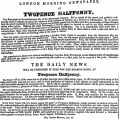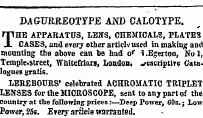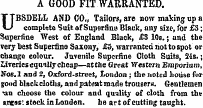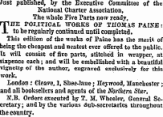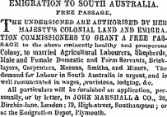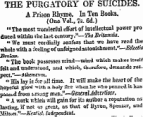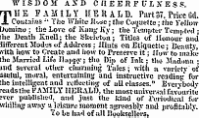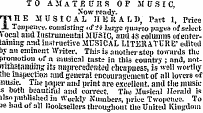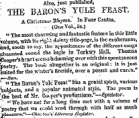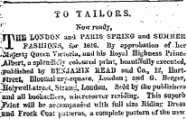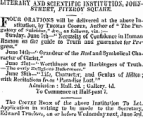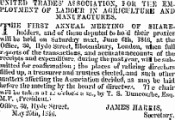On this page
- Departments (2)
- Adverts (15)
-
Text (7)
-

Untitled Article
-

On and after the First offme> THE D1I L Y N E WS,
-

i"ti i\i/j iinLiiiuN oJ AK. SATUllUAY, MAY 30, 1818.
-

Untitled Article
-

Untitled Article
-

Untitled Article
-

Untitled Article
Note: This text has been automatically extracted via Optical Character Recognition (OCR) software. The text has not been manually corrected and should not be relied on to be an accurate representation of the item.
-
-
Transcript
-
Note: This text has been automatically extracted via Optical Character Recognition (OCR) software. The text has not been manually corrected and should not be relied on to be an accurate representation of the item.
Additionally, when viewing full transcripts, extracted text may not be in the same order as the original document.
Untitled Ad
LONDON MORNING NEWSPAPER , AT TWOPENCE HASFF ^ NNY . _ -ieenth CentuT . Not to speak of the moral and political safe-The Sewspaper is the intellectual life of the . f ^" rieties of fortune , on a level as to information . By its means gawds which it affords , it places all , ' /^' Ufully against his wealthy rival for a knowledge of those changes only the smaU capitalist is enabled to contend success ^ . o ^^ ^ located ^ ^ - n ^ ^ settlements of ¦ which affiiet prices . Without the dalIy fL ^ 7 EuVonean Civilization . Yet it is remarkable , that more than a Canada as within ten nules of ^ S ^^ JV ^ biished in London , daily er three times a week-while now there are century since , there were eichteew paper * J « f «_ paICE ; onlriKTEEs ! Ofafactsortartung , what is tne cause « ' j „? -, <«» of havins a london Daily Paper is manifest , from the thousands who pay Thatthepnblicknowfliead rautageoin ^^ ^^ tj , ^ ^ g ^ causes , vlljcU ma £ ntein tha h 5 gh price ? pirst threepence for a paper ¦ tne o ?^ " £ e jnvcsted in a Newspaper speeulation . Next , the various talent and experience the amount of capital » P result The numher of th& requirements have , in truth , occasioned something which must combine " P ™"" - j al wavs commands its own price . Thus , whilst capital and competition have veryJi keamonopoly ^ na muuujjuj ^ . nothing has been attempted , in the direction indicated , for the political been ^^^^^^ ge great nations ; and a Daily Paper stitl remains a costly luxury , in which only the wealthy can indulge . -rncnt is about to be tried of establishing a London Dall v Xewspapw , on the highest scale of completeness J ? MSalltokforsi'PP ort > ! Wt t 0 oomparatite ^ fea readers at a high price , but to many at a low price ; therefore after the First of June , THE DAILY NEWS WILL BE PUBLISHED IN TIME FOR THE M 0 RMXG MAILS , AT Twopence Halfpenny , The Paper will be of the same size as all other journals were within seven years ; it will be larger than many of the iigh-priced daily journals are now ; and , in every particular of iuterest , it will contain as much information as the most successfufamongst its contemporaries . But it will be expansive ; aud double sheets will be given whenever an important Debate , a pressure of Sews , or Advertisements require it . The marking features of the scheme are : 1 st THE DAILY NEWS will offer to tha reader , in what it is hoped wil he a more tystematic form , all that he can find in the most approved of its competitors . 2 ndly . To the reader who paysFivepence for his paper , the same thing is offered at half the price . It , then , only remains for the publie to justify the experiment Let him who would support it , subscribe at once . "Where even the reduced price is beyond bis means , let him at once join with a neighbour in subscription . Every Sews Agent will , it is hoped , supply the paper at Twopence Halipenny , whehe paymeft is MADE in ADVANCE : the same proportionate allowance as with other papers—something more than twenty-four per cent . —being allowed to the trade . When credit is given , it is a matter of private arrangement , with which the Proprietors have nothing to do . As , however , in an undertaking so bold and so novel it is advisable to guard against possible inconvenience , the Proprietors of THE DAILY 2 TEWS will undertake to get all persons supplied who shall forward a Post-office order payable to Joseph Smith , Daily News Office , Whitefriars , London . Fob Thbee Months , Ids . 4 d .
Untitled Ad
THOK&S COOPES . THE CHARTIST'S WORKS . To be had of Join Cleave , and all booksellers . ( Price One Shiiling . ) TWO ORATIONS AGAIXST TAKING- AWAY HUMAN LIFE ,
Untitled Ad
DAGURREOTYPE AM > CALOTYPE . * THE APPARATUS , LENS , CHEMICALS , PLATES CASES , and every ether articlvused in making and mounting the above can be had o < ° 1 . Egerton , So 1 , Ttmple . street , WMtefriurs , London , ^ escriptire Cutalogues gratis . LEREBOURS * celebrated ACHROMATIC TRIPLET LENSES for the MICROSCOPE , sent to any part of the country at the following prices : —Seep Power , 60 s . ; Low Power , 25 s . Ererv article warranted .
Untitled Ad
A GOOD FIT WARRANTED . UBSDELL AND CO ,, Tailors , are now making up a complete Suit of Supsrfinu Black , any size , for £ 3 ; Superfine West of England Black , JES 10 s . ; and the very best Superfine Saxony , £ 5 , warranted not to spot or change eolour . Juvenile Superfine Cloth Suits , 24 s . ; Liveries equally cheap—at the Great Western Emporium , Nos . 1 and 2 , Oxford-street , London ; the noted house for food black cloths , and pa teat made trousers . Gentlemen an choose the colour and quality of cloth from tht artss - stock in London . he ar t of cutting taught .
Untitled Ad
Just published , by the Executive Committee of the National Charter Association , The whole Five Parts now ready . THE POUTICAL WOEKS OF THOMAS PAINE : to be regularly continuud until completed . This edition of the works of Paine has the merit of being the cheapest and neatest ever offered to the public . It will consist of five parts , stitched in wrapper , at sixpence each ; and will be embellished with a beautiful vignette of the author , engraved exclusively for this work . London : Cleave , 1 , Shoe-lane ; neyirood , Manchester ; and all booksellers and agents of the Northern Star . 2 J . B . Orders executed by T . M . Wheeler , General Secretary , and by the various Sub-secretaries throughout the country .
Untitled Ad
EMIGRATION TO SOUTH AUSTRALIA . FREE PASSAGE . T HE VisDEllSIOHBD AMB AUTHORISED BY HEli . MAJESTY'S COLONIAL LAND AND EMIGRATION CO . VIMISSIONEKS TO GRANT A FREE PASSAGS to the above eminently healthy and prosperous Colony , to married Agricultural labourers , Shepherds , Male and Female Domestic and Farm Servants , 13 ricklayers , Carpenters . Mnsons , Smiths , and Miners . The demand for Labour in Souti Australia is urgent , and is well rtinuivjvatttl iu wages , provisions , lodging , itc . AH particulars will be r ' uruislicd on application , personally , ur by litter , to JOHN MARSHALL & CO ., 2 fl , Bircliin-Iahe . London ; 79 , High-street , Southampton ; or at the Emigration Dsnot , I'lvmouth .
Untitled Ad
THE PURGATORY OF SUICIDES . A Prison Rhyme . In Ten Books . ( OneVoL , 7 s . 6 d . ) « The most wonderful effort of intellectual power pro duced within the last ecntury . "— 'Ihe Britannia . " We must cordially soafess that we have read the whole with a feeling of unfeignedas tonishment . "—Eclectic Seaiea . " The h , OOli possesses niiaa—mind wlricn makes itself felt and understood , and which , therefore , demand ' s rsspect . " —4 tto < n--ai . " His lay is for aH tiaie . It will make the heart of the liopefol glow - ISi a lioly sre ^ viien lie vrho penned it kas passtd from tiuoag men . "— GeneralAdmtissr . * ' A work which will gain lor its author a reputation as lasting , if not as groat , as that of Byron , Spenser , and Milton . "— -Kentis ! : Independent .
Untitled Ad
' "Hanv of tlxs stories exhibit considerable vigour of pencil , sbreno sir . se , and clear-sighted observation , accompanied with a 2-: iad ) y , genial feeling and toleration , ire were not jr-fS « l for from so determined a politician . "— Giame Citizen .
Untitled Ad
rpO BE PUBLISHED OS WEDNESDAY , JC ' -VE 3 , JL 16 Padres , same size as the '' People ' s Journa , " Price 2 d ., THE IlEASONElt : A Weikhi Paper—Coinmunistii : in Social Economy Utilitarian in Alorals—Republican in Politics—and Aniltheological in Religion . J . Watson , 3 , Queeu ' s Head Passat ™ , l ' ateruoster-row .
Untitled Ad
VT IS I ) 0 M AND CHEEK F V L S E S S . TII E FAMILY HERALD . Part 37 . Trice ( id . Coutaius ; ' The White livse ; the Coquette ; the Yellow lJomino : the Love of Kang Ky ; the Tempter Tum |/ ted ; the Death Knell ; the Skeleton ; Titles of Honour and different Modes of Address : Hints on Etiquctto ; Ucautv , with how to Create and iiow to Preserve it ; Ilow to make the Married Lifo lla )> i > y ; the _ Dip of Ink ; the Madonu ; and several other charming Titles ; with a variety of uselul , moral , entertaining and instructive reading for the intelligent and reflecting of all classes . " Everybody reads the FAMILY HERALD , the most universal favourite ever published , and just the kind of Periodical fur whil : ii » awny ajoisuiv moment agreeably and profitably . To be had of all IJooksellers .
Untitled Ad
TO AMaTBURS OF M U S I C , Xow rcadv . mHE MUSICAL II K It A L I ) , Part 1 , Price JL Tenpen-.-e . consisting of : 'i large quarto pages of select Vocal and Instrumental MUSIC , and 4 S columns of entertaining a : id instructive MUSICAL LITERATURE' edited by an eminent Writer . TIiib is another step towards the promotion of a musical taste in this eountrv ; and , notmtiistamlinjf its impim-dented cheapness , is well worthy the insjiectioM and general encouragement of . ill lovers of inusie . The paper und print are excellent , and the music is both b ? aut-ful aud correct . The Musical Herald is also published in Weekly Numbers , price Twopence . To be Siad of all llooksellers throughout the United Kingdom
Untitled Ad
Also , inst published , : THE BAKOK'S ' YULB FSAST . A Ciirlstnuis B % J » e ! " In Pour Cantos . - ( One Vol ., 5 s . ) " The most charging and fantastic feature in this little Volume , -with its ri :. t dainty title-page , is the exuberance , kno soolli v »' sav tlic aj'iio = itenc 35 of the difierent songs enannted rouiii ths ingle ill Torkscy Hall , Thomas Cooper ' sheart st-en . s brimming « v < - '"* tJlis spontaneous poetry . The V-ouii altogether Is an original : it is just saitenfor the winter ' s fireside , over a posset and curds . " ! r " » Th * eBaroTi ' 5 YuU- T ? eswt"h " as a genial spirit , various Wkjects , ani a jionuLir animated * style . The poem is ' the best of Mr . Co ' . nici ' s productions . " — Spectator . ~ * ""We have not for along time met with a volume of " poetry that we cmAA read through with half as much pleasure . *—O 7 «* t ; ; o ; fs-Literary Jiegistsr-
Untitled Ad
: TO TAILORS . . ' :: Now ready , JTMIS T . Q >* T > OX acJ PA 1 US- SPUINS and SUilifEll . " . JL J"ASinb . X 5 , for . ISiS . By approbation of . her / Slajerty Queer . Viclyria , anil his Royal Highness Prince . Albert , a splsn 3 i ' - " y coloured piint , baaut'fully executed , . yaljlished by BESJAiUX HEAD and Co ., 12 , Ilartftreet , BICORISI u 17-squ . it e , London ; and G . Berber , rjHo ! jv : el ! -st ! 'e ^ t , Sisaii ::, Loudou . SnU bj the publishers and all booisdivi ? , wheresoever residing . This superb jPxint will be acccia ;« : iri ? d with full size Riding Drtss . and Frock Goat patiemb . a complete pattern of thensw
Untitled Ad
LITE 11 A 11 Y AXD SCIENTIFIC INSTITUTION , JOHJf-STJfSET , FITZUOY SQUARE . FOUR ORATIONS will be delivered at the above Institution , by Thomas Coopek , Author of " The Purgatojy of suicides , " &e .. as follows , viz .: — Sunday . June 7 th— " Necessity of Cunfufcnw m Human Reason its the guide to Truti ' i aud ffu « raittee for Fw gress . " June 14 th—<• Grandeur of the Heal and Symbolical Character of Christ . " June 21 st—•• Worthiness oftlie Harbingers of Truth —The early lleil ^ I .-Ks Heforiners . " June 28 th—« I iw , CharactiT , and Genius uf Milton ; < ntU Ueeitatioiis £ e < , < . u 'l ' aviulka Lost . '" Admission : Hull . 3 d . ; Gallery . Id . To Commence at Half-past 7 . Tfie Coffee lioox of tlw abnvo Institution To Lei . Al » 3 » Hi-atii > n iu writing to be made to the Secretary , £ d > vard Tpuvlovs on < jj- before Wednesday next , June 3 rd .
Untitled Ad
UNITE !) TRADES' ASSOCIATION , YOU THE EMplov :. ie : < t op lajjouh is agmcultukk and "manufactures . the first annual meeting of siianeholilcrs , and of those diluted to hold their proxies will be held on Saturday ntxt , June fitli , 1810 , at the Office , 30 , Hyde Street , lJloosnsbury , London , wlien full r .-pr . rtsof the transactions , and aecuiate accounts of the receipts and expenditure , during the past jvar , will besuujiiiltoii ft » r coniirinatioii ; the places of retiring directors filled up , a treasurer and trustees elected , and such other matters afieetins the Association decided , as mav be laid before the meeting by the board of ilirecti'iv . Tin ; chair wiil l > e talvi-ii at 4 . J o ' clock : > n :., by T . S . Duneoiube , £ sii . 11 . P . i President / - Office . : }
Untitled Article
TJLE STHUOGLE . " THE CONFERENCE .-TUE STRIKE . We have drircu the Tim-s and Dispatch into the narrowest possible corner . We have poached them as '" ferrets poach tutir game , until at length the animals find mo escape hut must surrender . The Times of Monday last has favoured us with a very long and rubbishing sirtiele , into which it introilucnil the midnight ravi lisa of one Mr . Holme , and which h as follows : ¦ — Mr . Holme gives the following version of the origin of this declaration , he thus . "hows tlia tit was not tiie masters , but the workmen , who at first originated it . llv
•¦ Some years ngo , we Iwd : i strike of eighteen weeks ' duration , ami near its close , I was disturbed : it midni ght by a ringing of 1113- door bell , two or three times gently re . peateil . On looki . M" out of roy bedroom window , I found thatit proceeded from'thrcc of my workmen , then on the strike .- Thev desired . me-to admit them , and , contrary to the wishes of' my famlly ,. I did so . They told me thnt ouipremises were' so nvll watched until late in the evening that they iiad come at th . it untimely hour to avoid being seen by any of the other turnouts ; . and they urgently re-
Untitled Article
quested that I would listen to them . They told me that they were in great distress ; that the tyranny of tlie-dvi > was beyond » U endurance and that many of our men , as well as themselves , were determined to go to work , if they could get any excuse for quitting the club . Hold them that the authorities would protect them , and suggested that they should go to work with a number of men whom we had obtained from a distant part of the country . They replied that they should be marked if they did this , but added , that if they could sign any document which could be binding upon them , it would give them the opportunity they wanted , During a long conversation , one of them admitted that both himself and his family were
in actual want , when another replied that they m » B nt as well be killed as starved , and he strongly urged upon me the necessity of devising some mode by which tliey might escape from the clubs . ' One of these men is now the foreman of a large employ ; one is since dead ii an the other was not long since in the service of the Doct Trustees . I mentioned the singularity of their visit ana conversation at a meeting of the masters soon afterwards , and the subject of a declaration that the men would quit the union was suggested as being sufficient , and one was drawn up , carefully avoiding everything which could in
any way legally bind a man . It was simply declaratory that they would not continue to be members of the uuion . This was submitted to a number of the workmen , and declared to be what they wanted . In less than a week the strike was at an end , for every man that resumed his work first attached his name , and not a few added , Now I am free . ' The union immediately died a natural death , and many of its then leaders were compelled to do what tllOy much dreaded—they were compelled to work . This is a bri f acceunt of its origin , and I might add much more , but it is unnecessary . "
From tMa article we learn thatthe said Mr . Holme contends for the unenviable distinction of patentee of the newly * inveated declaration , and , as in all other caseg , the inventor and his backers parade the instrument as akind of working man ' s life preserver ; but we may ask , if Mr . Holme or the Times c ^ n for a momen t hope to palm this midnight rubbish of olden times , furbished up for present use , upon the existing labour mind of the country . And even if we did believe in the treachery of the three midnight assassins who
watched for an opportunity to approach Mr . Holme ' s house by its unguarded avenues at midnight , to what other conclusion can it lead them than that Mr . Holme was , SOME YEARS AGO , a black sheep , suspected by Ms hands , and his premises watched , and what other opinion can be formed of tho three midnight prowlers , than that they were dark traitors to their order ; an opinion which is fully confirmed by the fact that Mr . Holme is ashamed to mention their names , while he does TELL US " THAT ONE OF
THESE IS NOW A FOREMAN IN A LARGE EMPLOY , ONE IS SINCE DEAD . AND THE OTHER WAS NOT LONG SINCE IN THE SERVICE OF THE DOCK TRUSTEES . " Here then we have the confessed qualification for masters' favour—it is the betrayal of labour . Nowj whoever recommended this masters' scribe to rash into print ; why had tiiey not the candour to inform him that he was critically proving our case ? Why did they not tell him that we , like Mr . Holme , have always seen the facility with which a few artful masters could break up and destroy the best arranged machinery of LOCAL CLUBS , and that it was
dear bought experience of their inefficiency that rendered the formation of agreat national association indispensable . The Dispatch tells us , and the Times tells us , that neither they nor the masters have any objection to the existence of local associations , against which aggregate oppression may successfully contend , while they reprobate . the existence of a general combination . Now , let us see whether we strain our reasoning too far , when wo assert that the law and its administration are of themselves a great aggregate combination of masters' power , against which nothing , save a combination of labour , can successfully contend .
Society is variously and whimsically constituted . The master builders , and indeed , the masters of every other trade , feel themselves aggrieved by the attempt of their hands to participate in the prosperity ot trade . Every mouth is full of the advantages to flow from the new order of things . A great confederation of economists and philanthropists is established , whose motto is—change ; the promised result of which , not to one , but to all , is , " HIGH WAGES . CHEAP BREAD , and PLENTY TO CO . '" " Coming events east their shadows before ; " and in
order to prepare themselves against the possibility of danger from the promised blessing , the masters commence by putting their " house in order . " They not only refuse their hands any participation in the boon , but they farther degrade them by making selfdebasement the condition of existence . At once resistance is met by the denunciation of the press , the threat of the law—not of the ordinary law , but of a law to meet the exigency of the ' case—and hy tho kind fellow-feeling and charitable consideration of noblemen and gentlemen for whom the free trade master-class have contracted to build .
Railway societies , the law , the wealthy public , and communities of all shades and descriptions , enter into the sympathetic combination in behalf of the OPPRESSED AND ILL-USED MASTERS ; while not a word escapes tho lips , not a line conies from the pen , not a sigh from the sympathetic-, upon behalf of oppressed but struggling labour . Are nut these odds sufficiently fearful , and can they be otherwise met than by a similar combination on behalf of labour ? HvsDispatch informs us , that the masters have no objection to focal societies . We * know they have not , but labour lias ; because labour has tried them aforetime , ami has found them useless , inefficient , and expensive . We stated the case of the men
on strike seme few weeks ago , in its proper bearing . We stated it thus . That high authority , the Times , amongst others , assured us of the great benefit that SOCIETY , not the master builders alono , was t <> derive from the great commercial measures of Sir Robert Peel , to the effect that all building materials would be considerably reduced in price . fi'i argued that the change , to bo just , should be a national and not a class benefit ; and that it was unjust that the master speculator , who had contracted for WOl'k according to old and expensive regulations , should be allowed by the new policy to monopolise the lion's share of the change , while labour , that constituted the chief value of the work , should not only go unrequited , but should be degraded .
We asked the men , then , to be beforehand with masters . We asked them to send deputations to those for whom work was contracted to be done , not that we expected much sympathy from the capital class , but in order that labour may do for itself what the press and the law have invariably refused to accord to it . Was there anything unjust in this ? And is it NOW CONTRARY to the principle of political economy , or to the laws of the land , that labour should make its best contract , and that it should buy in the cheapest and sell in tho dearest market , and that ifc , like tJie capitalist , should establish a combination of its centralised power , to manage its own affairs , and especially to watch the doubtful results of tho great changes now in progress * in order to secure for itself its fair share in the new order of tiling
Now it is for these things , and for tlicso thing ? only , that virtuous labour has been struggling against vicious , rampant , and intolerant capital . Ami it is to arrest ilia progress of this generous , confiding , but tardy struggle ; it is to stop the course of this natural current , into which hope was led by promise , that the blundering prostitute press , tiic Times , Dispatch , Manchester Guardian , the Weekly Chronicle , and its Maltlw-ian tenant , are directing their advertising columns . It ' we were at a loss 1 ' ov defence I ' the labouring classes it would be found in the fact
that they have no other defender—in tho iiicfc , that if we believe the literary , the aristocratic , and wealthy portion of society , lab-iur has never yet been right . If its cauhe is good tho time is injudiciousif the time-be judiciously chosen labour ' s ranks are led by artful aud designing demagogues—if the time is judicious , and labour without eloquence takes its position and mumbles its own complaints , then the cause 13 bad , as its advocates , we are told , can offer nolhhy in iU defence - so that kbour is like the drummer , whether it hits capital high or low it never can pJease it .
We do not belong to that class who are led by ma-Kic , or driven through the paradoxical windings of interested reasoncis , we take our plain subject and argue it plainly , and if it is complex or intricate , we unravel the entanglement for simple readers . As with justice then , so with labour . If a poor man makes claim upon a rich man , the very INSOLENCE OF CLAIM to us furnishes zprima facie title . So
Untitled Article
with the complaints of labour . Its very murmur u a constitutional indictment ; , its complaint is an unanswerable declaration , and its willingness to starve rather than submit , is enough to furnish the unprejudiced mind whereon to find a judgment aganrat capital . la there no keennessin hunger ? Is there no charm in independence ? Is there no desire to possess the good opinion of an indulgent , or even a lair master ? Or is labour so rampant that it does not know when it is well off ? And » ve the labouring classes of this generation less capable of Judging o » those things than their ignorant forefathers were ?
Thus we have dealt with the merits of the case , and now turn we to the consideration of a few not unimportant faets . We ventured an opinion early in tho struggle that the first yielding on the part of the men would but increase the insolent demands of the masters , and that we were right is amply proved by the two following documents-the first evincing the self-debasement of a half-dozen crimped slaves , who no doubt kid the foundation of their treachery in a midnight visit to the unguarded mansion of Mr . Holme , or some such philanthropic friend of labourthe other the noble , the spirited , and timely-expressed resolution of labour's self .
DECLARATION of PRINCIPLES upon which a . SOCIETY of the OPERATIVE CARPENTERS and JOINERb of MANCHESTBR and SALFORD SHALL FORTHWITH BE FORMED . —We , ft portion of the Carpenters and Joiner * of the aforesaid Uoroughs , are of opinion , that a combination of the different branches of the building trades , extending throughout the kingdom , is alike detrimental to the interests of journeyman and employer ; we , therefore , resolve to dissent and wi thdraw from the combined society of the building trades , and to establish a Society of Carpenters and Joiners , that shall be confined to the aforesaid boroug hs . This society shallnot interfere with the employers in the manner of carrying on their business , or as to what men tln-y shall or shall not employ ; nor shall its funds be appropriated to the support ot any S eneral trade , ' union .-Signed % ^! Smsmw ' . DANIEL DOUGLAS ;
J © HN WILLINGHAM , JOHNAITCIIISON . ' JOHNBBITIjHOTJSE , " SAMUEL HARKISON , Clarendon Inn . May 22 nd .
Untitled Article
generouflsoulreTolts at deception . If you stand by him , your triumph is sure ; if you betray him , you render him weak , useless and impotent . On Monday , the organised trades meet at the Hall of Science , Manchester ; it will be a day memorable in the annals of labour , if properly used . We see nothing to object to , but much to admire in the com * prehensive , though prudently undefined , programme of the governing body . It is the root ; from your genius will , must , spring the branches , and from the branches will shoot the foliage beneath which we ^———^«^» m^—mi
hope and trust to see a shade and happy home for every son that's doomed to toil . The right is upon your side , and may God speed the righteous , and may labour ' s delegates succeed in levelling the throne of despotism in the dust , and erecting its own temple of liberty upon the dishonoured ruins . Though The blackness of ashes should mark where it stood , While the wild mother screams o'er her famishing brood , Labour ' s battle once begun , Bequeathed by bleeding sire to son , Tho' baffled oft , is ever won .
Untitled Article
force—it is not any or all of these that menace peac « and order , it is theprOgres . " ' " Such now are the foreign elements which the commercial policy of England'his invited to take part in her future conflicts . The policy of Engla nd , fot many years , has been to make this country the great boiler for feeding universal machinery , nei statesmen vainly hoped to erect a CORDON arouad her shores , through which her produce may escape
but through which no democratic principles should enter . It is to regulate this anomaly—it is to hold up an ancient system in the midst of universal assaults that Sir Robert Peel now directs his attention , and it is to close the breaches , stealthily made , that Stanley and Bentinck so industriously struggle , Had they regulated MAN'S MONSTER-ENEMY r-MACHINERY—and had they arrested the march of pauper degradation , instead of waiting the hour
of their own weakness to PROMISE A RE . TREAT—had they heard us when we were weak and they were strong ; and thus evinced a disposition to act from justice rather than caprice , we might have heard their moans in the wilderness , and in reciprocal justice have run to the rescue . But when they were strong , they too coerced us , and starved us . They allowed no undivided
triumph to Whig tyranny and despotism , but claimed honourable participation in every act of oppression . And is it with men like these that we , the veritable Chartist party , the movement party , as the Times tells us , so menacing to tyranny all over the world , are now to unite fortheSTEP-MOTHER ' S BIT , for a slight relaxation of their own adopted policy , and that only offered because they are powerless and weak , ridiculous and contemptible without us .
Upon the other hand , are we to fly to the rescue or swell the train of the LITTLE MAN who invited the people to all but revolution , and then used his power to crush them ? Are we to aid in giving power to the master-class—the Malthusians—the political economists and PINCH BELLIES ? Are we to believe their confession , that they require law ft make them just magistrates , honest masters , true jurors , and Christian neighbours ? NO ! What
then ? STAND ALONE . Stand in the midst of the breakers of faction , watching with contempt the heaving of oppression ; and , as they have done , use our strength to take advantage of their weakness ; looking not to fragments of measures , but to the means of framing measures for ourselves ; fighting them one against the other , until the weakness o £ the defeated shall compel them to offer the only terms that our strength tells us we have a right to expect
—OUR CHARTER . The people must have seen , and the werld must learn , from the recent debates in the House of Commons , that the labouring classes are far in ad . , vance of their representatives , and they mu 3 t entertain a corresponding disgust for the representative assembly . Peel has attempted to persuade us that he was sincere in his measure of ' 42 , and is . sincere in his projeet of ' 46 , but from the moment that Stanley w » 3 p itchforked into the Lords , we predicted that Peel wag clearing the way for Ms own retreat . Nay , we sus pected him long before that ; in June , 1840 , six yean ago , we published Peel ' s dream , the principal feature of which was his anxiety for Stanley ' s removal to
the Lords . His dream is out , and so will he be ' ere long , for the Whigs will not bear his monopoly of office , and the betrayed Protectionists will not tolerate his continuance in power . Thus we pledge ourselves to no party but our own ; we will watch , the coming struggle , and will brave the danger ; but we will not accept condition or compromise from either party upon other terms than we have prescribed ; because we believe , as we have long foreseen , that i , it is impossible , wholly and entirely impossible , to subdue machinery to man ' s wants , and , to limit it within legitimate bounds without a FULL , FAIR , AND FREE representation of the whole people in . the Commons House of Parliament .
On And After The First Offme≫ The D1i L Y N E Ws,
On and after the First offme > THE D 1 I L Y N E WS ,
I"Ti I\I/J Iinliiiun Oj Ak. Satulluay, May 30, 1818.
i"ti i \ i / j iinLiiiuN oJ AK . SATUllUAY , MAY 30 , 1818 .
Untitled Article
1 ^ ! AT a GENERAL MEETING oftlie Carpenters and Join ers of Manchester , held at the Carpenters' Hall , on Thurs . day . May 21 st , it was unanimously resolved , — That this meeting views with feelings of indignation the proceedings of a few individuals , who , actuated by motives at once contemptible and unprincipled , have thought proper to secede from this body , and among Hieinselvestopass resolutions quite contrary to the rules of this society . Resolved , —That this resolution be published in the public papers , with a vote of censure from tills body upon those persons who are actuated by selfish motives , and whose conductis calculated to prolong the strike now pending .
The committee beg leave to state , that the only tlung which prevents a settlement of this dispute ,. is the docu . ment which the masters require each man to sign , The men are willing to resume their employ at the proposed advance of wages , and work 57 hours each week the year through . By order of the Committee . It is said " what ' s in a name , " but when we read the signatures of the half-dozen traitors we are struck with the identity between the names of ene of the proselytes and that of the Chairman of the Newton censpiracy . One to be sure is called David Bellhouse and the other John Bellhouse , but we venture to assert that consanguinity has had something to do with the conversion of the President ' s POOR
RELATION . We have given the exultation of the great liar of the press upon the increased insolence of the masters when they had got the first wedge into the brittle minds of their dupes , and we would ask any man with a grain of common sense , if the terror of the national combination and the disregard evinced for the local clubs , should not be an inducement to labour to persevere in a perfect centralization of its powers ? If tyrants gain confidence from the yielding of a handful of their slaves , let freemen take heart when they read the following comfort from abroad . We give the letter as we received it from a most esteemed friend , and froni it will be seen that we have forced the cause oi labour across the " deep , deep sea , " and liavemade its wrongs . penetrate Into the hearts of Us banished sons . Here follows the
letter . Saint Germans Be Navarre , Department De L . Eure . Monday Morning , JIay 25 tb , 184 G . DEAR FSAKOUS , —I hasten to inform you of the proceedings at Navarre during the last few * lnys , in the catiSe of right against might . A meeting of a few friends to the rights of labour took place on Thursday last , at the house of Mr . Paul Rozenthal , a Polish refugee , to taku into consideration the present struggle ot the Trades Of England .
Mr . John Sidaway , Sub-Secretary and Ajrent to tin Chartist Co-operative Land Society , was called to tin chair . The chairman opened the business by reading the reports in the last week's Star . The unchristian an < i tyrannical manifesto of tho Newton despots , " called down the execration of the whole meeting . Propositions wm then carried to the following effect : — " That thi 9 meeting pledges itself to use every means in their power to support the men now on strike , and as a testimony of their determination , collectors were appointed to collect subscriptions on tilth- behalf . " It was also carried that 11 public meeting should be called for Friday the 21 st , for the purposo of explaining the nature of the strike ; and that Mr . Sidaway should be the secretary of the fund ,
and Mr . Thomas Harrison , assistant secretary ; that circulars Should be sent to the sub-masters and foremen ot' Mr . Jolm Oliver York and Company of Navarre , requesting their assistance and co-operation , in answer to which a few gave their attendance at the meeting . The public meeting took place on Friday night at 8 o ' clock . On the motion of Mr . Sidaway , seconded by Mr . Wm Ash ton , Mr . Samuel Penberthy , late of London , was called to the chair . The worthy-chairman opened the business by saying , he was pleased to sse so many of the English machanics meetingtogether to protect the rights of labour over capital . He was proud to sue that though exiles from their native land , they did not forget that they owed a duty to their fellow workmen in their mother country .
lie called upon them to see that the present important struggle for the right of labour , was not put down by the apathy of their own order . He should not OCCUPPJ their fiinu longer by any more remarks of his own , but should i ! ull on their secretary Mr . John Sidaway , to addresa them . Air . Sidaway then reviewed the various circumstances causing strikes , and administered a severe casti-¦ ,-ation on the Newton tyrants . He read over the coile of iTjjulatlons , aud made 3 oniD pointed remarks on them as he progrussod . He concluded a speech of more than an hour ' s duration , in a straiu that called down the cheers of the meeting . He then called on them not only to shew thuir disapproval oftlie master abomination , but to open
tlieiv purses and strike the death blow to tyranny of all shapes , by being united together in one pualatix _ of power , . vliieh would bring to the earth the temple of slavery , and er . wt in its place , a monument of Contentment and Happiness , dedicated to the rights of man . It was then : n-ranged that the various collectors should report prog ress on the next night at 8 o ' uioel ; , so thnt a ruport of the meeting should appear in the next week ' s Star . It was also desired that the secretary should forward the names of all the subscribers , with their several amounts and occupations , with a request to the Editor of the Star , to insert them in full , to show that Englishmen , though nt ai distance , are ready at the call of theii brethren . . Some observations where then mailu in reference to th «
imposition practised by somo interested parties , who enriched thumsclvcs , and left the objects of their assistaneo , eithor to go into work at tin mnatevs ' condition , or sOirtio . Mr , SMaway then replied to the satisfaction 0 / the meeting , p fating that all monies transmitted through she Northern Star was made public , and was applied to the proper purposes . The meeting then separated , after ^ iii ' iiii g the turnouts success , and resolved to meet on the morrow night , to see the state oftlie poll i" faVotll of the poor oppressed .
hi . it of Subscriptions in aid of the turn-outs of England ; collected by Messrs . Thomas , Harrison , and Sid-•| Wiiy ;—Mr . John Sidaway , chain-maker , 3 francs ; llr . lUtlW Fowler , stringier , 5 f j Mr . Samuel Smith , en--iiiecr , 5 f ; Mr . Edwarti Davis , master finith , 5 f ; Messrs . David Thomas , Even Thomas , John Taylor , Samuel Penberthy , Thomas Drown , smiths , Thomas Harrison , Win . Rhodes , turners , William WMteworth , John Hudson , Itoburt Culvert , William Hojgctt , carpenters , James Weston , sawyer , and Thomas Sidaway , bolt-maker , 3 f each ; Messrs . K ' . ilph Berfoot , bolt-maker , William Ashton , William Brown , John Barry , Barny Goodman , ami John llopcr , smiths , 2 f each ; Mr . Paul llozenthal , Polish refugee , 2 f ; Mr . Patric Kcogh , spring-maker , 2 f ; Mr . Christopher Shaw , fitter , 2 f ; Messrs . George anil Cutlihtrd Truman , moulders , 21 ' each ; Mr . Jnines Lee , cashier , 2 f ; Mr . Geo . YTintworth , millwright , 2 - Messrs . Edward Hall and Kouert iluthcws , If i-ach ; making a total of S 7 francs , ori' 3 5 s . lid . EnglisU money .
There , struggling trades of England , there is balm for your souls , consolation for your minds , your stan " daril is raised , your virtuous Hag , with your motto of- '
A FAIR DAY'S WAGES FOR A FAIR DAY'S WORK , waves in the breeze , and accursed be the traitor who strikes or lowers it . In a few hours after the voice of your co-opevating brothers in France shall have readied you , your champion and your chief will bo amongst you . ltally round him , for beliere us when > YC teli you that tho times are at hand when labour will require advocates of stout hearts and unbending minds . Show him that you are in earnest , for his
Untitled Article
THE REVOLUTION . Charge ! Bentinck . ' Charge—On , S tanley , on , Were the last words of Protecti—ON . Tory . Now ' s the day , and now ' s the hour , Sea the front of battle lower , See approach the Leaguer ' s power , The Leaguer , Chains , and Slavery Whig . Come one , come all , this rock shall flee , From its firm base , as soon as WE .
Lord George Bentinck has declared that the landed aristocracy of England will SHOULDER THE MUSKET rather than abandon their ancient rights and antiquated privileges , and nothing now remains but for labour , robbed of rights , and stript of its privileges , to prepare for the struggle . We have long seen the gathering cloud , and we have announced the coining of the crash , We were not alarmed whenPsEL proclaimed thenew | elementsout of which legitimacy should constitute its centralization , and by which it should uphold its authority iu shape and form , only differing from the system to be exploded . We saw the facility with which active capital
could manifest its power , and command obedience to its will . The rise and progress of Reform , and its subsequent failure , read a wholesome lesson to the movement party of England . We were the first to announce that the day of auction would come , when Peel and Russell would respectively bid for that power which confers patronage , and we are now gladdened to find that the improved condition of the stock has led to an increased competition . Stanley and Bentinck are now competitors for popular favor , and howsoever the long and lingering debate way
terminate , upon which the fate of the nation depends , we tell the people that , whatever the result may be , the day is at hand when they must prepare themselves to snatch from contending factions their share of the national spoil . We hare averred that the hew elements of national wealth ,, gave rise to a new national mind , that the creation of new national wealth was new national property , and that the full , entire and complete representation of the new national mind , was indispensable to the equitable dis . tribution of the increased property .
There was a time when our weakness and want of concentration would have induced us to accept such terms as our position entitled us to , but the day Of barter and compromise has passed . Even the Factory Bill fades into comparative insignificance—the repeal of the Poor Law Amendment Bill loses its charmthe fostering of native industry lacks its magicpower and looks small in the distance , when we compare them with the much that our position entitles us to
expect and demand . The ( actions neyer yet had a struggle in which the contending parties h-we no * bid faithlessly and recklessly for the only support vrhicb could insure their triumph , but in no case have they redeemed their extensive pled <* e 3 when the battle was won . Their bid has always been capricious , and the payment of the purchase has been always withheld upon the plea that their obstructive opponents were too powerful iu resistance .
We have seen hustings' exhibitions , . and platform vagaries . We have heard enthusiastic pledges , but we have seen ministerial favour and government patronage obliterate all recollection of the past . We have heard a Wortley , a Ward , and a Gisborne , a Bright , a Herbert , a Peel and an O ' Connell , and a Russell , gain daneerous power by hopeful promise and extensive pledges ; but we have found ene and all turn traitors , rank traitors , to the cause they professed to espouse . Why , then , longer potter with
chese sectional questions with which factions fight their battle ? Why ask men of broken faith to lie once more ? and give them opportunity to go on lying to the end ? Why now talk of compromise upon a Poor Law Bill or a Ten Hours' Bill , and why not rather say at once to faction , the day has arrived when we receive your promise as a mockery , a delusion , and a snare ; the hour has come when a united people may make themselves independent of your deceit .
We write thus because OUR PULSE HAS BEEN FELT , and because our ' party has been tampered with . We write thu 3 , that tho foe may know that we arc above purchase ; that the friend may believe that we are above suspicion , and may therefore confide in us . There were some men foolish enough to have forced us into a premature exhibition of our weakness by huddling us together for no other purpose than the gratification of some personal feeling . It is this that has . ever withheld a nation's rights . It is this egotism and selfishness that has disturbed and distracted the councils « f the people , and it was to resist another such [ exhibition that the directing
officers of Chartism wisely determined to uphusband their strength until it could be brought to bear upon di 80 Vganise < i faction rather than fritter it away upon individual conflict . Who that reads tke signs of the times , who that contemplates the power of an ancient aristocracy about to be plucked of their gaudy plumage , about to be shorn of their ancient privileges , and stripped of their usurped rigKts , who can witness the nightly conflicts in the senate House , who can cast a glance upoii the present state of Europe , who can reflect upon the position assumed by America even
in the midst of her own internal brawls , who can think of the age of the Iron Duke , confidence in whom serves as a band to keep the , rotten sticks of hereditary power together , . who can think of the broken-down health and old age Of the great peace preserver of the world , Louis Philippe , who can reflect upon the disturbed state of Ireland and the unquiet state of England , who can see the old key-StOnoabOUttobe atVUCk fi-om . the arch upon which society l « as so long stood as A GREAT FICTION , without coming to the conclusion that the crash must oome and that it will be awful in its results .
It Is not mauy months sinBe we [ endeavoured to map out tko future state of England from the position of Continental Europe ; although it is some years since we showed that our altered position , since we could shake hands with Am . erica and kiss France , would have a terrific tendency npon our future operations . Well , when we stood alone we were firebrands and alarmists , but perhaps the following state of Europe , which we take from the Times of Thursday , may inspire the incredulous with
confidence in our future predictions . The Times says , " The evidence that the elements of a coining , though possibly distant , storm , exist on the continent is pressed upon us in neurij ovory lutter wo receive from France , Italy or Germany . Of the state of Spain and Portugal our readers requiro not now to be informed . The condition of Switzerland would be deemed alnnnimj if anything done by the mountebanks at the head of the movemen t in tbo eantong could appear important , Throughout Germany a ferment prevails , the profundity of which
is not appreciated by the Governments of the various states of which the confederation is composed . The Italian peninsula , from north to south , is notoriously agitated , hembardy and the Legations are even represented as ripe for revolt tho moment when Austria shall have occupation elsewhere . To Poland it is unnecessary to refer . " It is not , " says one of our private letters , " the force of Russia , the strength of our armies , the depth of her intri . gue , or the uubounded character ef her ambition , nor the power and the absolutism of Austria , and Prussia , u » r the selfish views of France , sTaosoB ^ d by vast military
Untitled Article
PARLIAMENTARY REVIEW . The arena of the great contest of the session has been transferred from the House of Commons to the House of Lords , and public interest has followed it thither . Since the memorable days of the Reform Bill that house has presented no such scene as it did on Monday last . Every available seat on tho floor was occupied ; a crowd of Members of the other
house cluatertd about the steps of the Throne ; the side galleries were filled with Peers , Foreign Am * bassadors , and a sprinkling of Peeresses ; the strangers' gallery was crammed to suffocation , the galler ; appropriated to Members of the House of Cominona was full , ( amongst others we noticed Mr . Cobden and some of the leading Leaguers ); and even the Reporters ' part of the house testified to the general excitement , by being crowded in every corner where even standing room could be obtained .
The number and variety of the classes who thronged the house was not the only external symtorn of the vital interest felt in the struggle . The staid , sober , measured tone and manner of the grave Senators of the Upper House evaporated under the strong influences of the moment . They almost forgot tiiey were Lords and became Men , men at leaafc so far s to lose sight of the conventional frigidity of manner , the icy proprieties which are considered the distinguishing characteristics of their " order . " They laughed , groaned , shouted , cheered , and swayed to and fro , passion-tossed , as tmnultuously as any de * mocratic assembly under the strong stimulus of passsionate and stirring influences could be accused of doing .
The crisis had arrived—llie last , or nearly the last struggle was to be made for the maintenance of one of the main causes oftlie proud pre-eminence of the English over all other landed aristocracies . They were aware of the raomoutous nature of the conflict and they met it with the characteristic courag e of the Anglo-Saxon raco , if not with the calmness and composure of far-seeing statesmen . The Duke of Richmond chivalrously threw himself first into the breach , at the head of the Protectionists : but hi ? indignation at the inconsistency . ' and treachery of the Peelitos was so huge , that it prevented Mm from
doing justice to his own prowess , or much damage to the free trade measure . Tho mosk effective part oi his oration was the carefully culled selections from " Prosperity Robinson ' s" speeches , the author of the Cora Bill in IS 15 , the defender of every Corn Bill since , and noiv , in his capacity ot President of the Board of Controul , the proposer of the final abolition of all Corn Laws ! The reading of these extracts excited immense laughter aud cheering from both sides of the IlouSe , wlliell lllU 9 fc ) we imagine , have been anything but gratifying to the ears of my Lord Riros . The Duke did not confine his attack to the deserters from the
Protectionist . camp i he made a furious onslaught on tuG Leagae and its leading orators , which caused Mr . Cobden to have recourse once or twice to a pinch of snuff during Us delivery . No doubt it will be repaid with interest the firat opportunityt E » Fitzwilliam followed , and avowed his preference for a fixed duty ; but he felt bo had no alternative left but to support the ministerial measure , which he did , at the same time compensating himself by abusing its authors . Tiie Duke of Clbvsland followed , with a Protectionist spoeoh of the usual kind and calibre ; and tho Marquis of Londonderry threff the House into convulsions of laughter by his genera '
eulogy upon inconsistency . But these preliminaries over , then came' " the"tug ' . of war . " Amidst loud cries oi' " Stanley , Stanley , " the chosen leader of the Protectionist forces rushed forward to the ta ble at nine o ' clock , and commenced amidst dead silence an address whick lasted till nearly half-past twelve-The silvery sweetness of his voice—the exquisite and finished excellence . of his language—the artistic !* structure of his sentences-the skill with which b * selected his points , and the exuberance , the overflowing wealth of illustration he brought to beat upon them , altogether constituted a magnificent oration , and though we , " neither admire the cause »•
Untitled Article
¦ ¦ - ___^^ . . ^ ¦¦/ " , . ) r .- ] ''' ' ^ m ^ 6 r " m ^' ' - *¦'¦ A - - - - - — ¦¦ ' ' " >¦ . " - * i-..- ! - ¦ ¦*¦ ' - ' t -- ^" ' - - —————^**^— ' ^^ ^____' _ , ^ 1 ^ — ^ ^^ mi ^^^^^^^^^ m - ^~« ^ —— . ¦ ii * . 1 ¦^^^^ w * ¦ ¦ 1 — .. i . iimii- . . II ^^^^ BBifc
-
-
Citation
-
Northern Star (1837-1852), May 30, 1846, page 4, in the Nineteenth-Century Serials Edition (2008; 2018) ncse-os.kdl.kcl.ac.uk/periodicals/ns/issues/vm2-ncseproduct1368/page/4/
-
